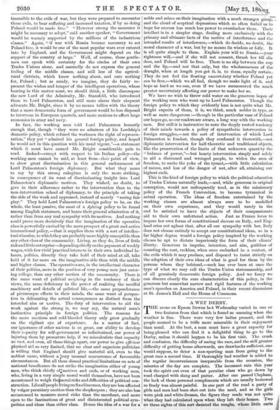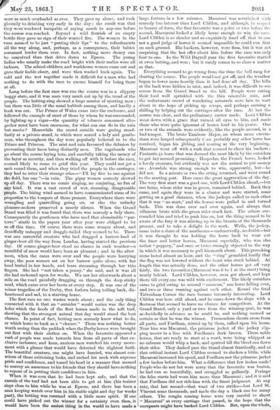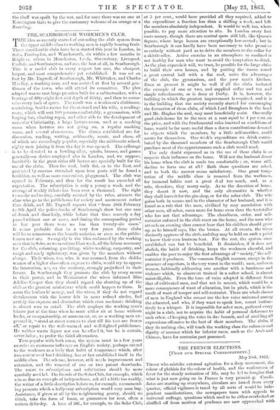A WET DERBY.
THE scene on Epsom Downs last Wednesday varied in one or two features from that which is found so -amusing when the weather is fine. There were very few ladies present, and the people seemed to be a trifle more miserable in their enjoyment than usual. At the best, a man must have a great capacity for being pleased who can find it a delightful thing to go to the Derby, unless it should happen to be his first visit. The crush and confusion, the difficulty of seeing the race,and the still greater difficulty of getting home afterwards, are drawbacks sufficient, one would suppose, to deter a non-sporting man from going to the- great race a second time. If thoroughly bad weather is added to- the regular inconveniences inseparable from the occasion, the miseries of the day are complete. The incessant rain this year took the spirit out even of that peculiar class who go down by road charged with slang and patter. After one passed Clapham, the lack of those personal compliments which are usually bestowed so freely was almost painful. In one part of the road a party of girls and men had been shot out into the mud, and as the girls wore pink and white dresses, the figure they made was not quite what- they had calculated upon when they left their homes. Two or three sights of this sort daunted the roughs, whose little carts were‘s much overloaded as ever. They gave up abuse, and took gloomily to drinking very early in the thy; the result was that they were rendered incapable of saying much to any-one before the course was reached. Beyond a wild flourish of an empty bottle they gave no sign of their wonted fire. The women in the vans seemed to be just "putting their lips" to the refreshments all the way along, and, perhaps, as a consequence, their babies screamed louder them ever. In fact, nothing more dreary can be conceived than that drive down to Epsom. The young ladies who usually make the road bright with their smiles were all indoors. The school-children and workhouse women came out and gave their feeble cheer, and were then washed back again. The cold and the wet together made it difficult for a man who had nothing to do with the race to excuse himself for being there at all.
Long before the first race was run the course was in a slippery boggy state, and it was soon very much cut up by the tread of the people. The betting-ring showed a large muster of sporting men ; but there was little of the usual hubbub among them, and hardly a book was out. The Prince of Wales came into the enclosure, and followed the example of most of those by whom he was surrounded, by-lighting up a cigar—the quantity of tobacco consumed alto- gether must have been enormous, for what can one do in the rain but smoke? Meanwhile the crowd outside were gazing stead- fastly at a private stand, in which were seated a lady and gentle- man, who throughout the day were popularly believed to be the Prince and Princess. The mist and rain favoured the delusion by preventing their faces being distinctly seen. The vagabonds who go about the course laying bets, and carefully taking the money of the layer as security, and then walking off with it before the race, seemed likely to come to grief this year. They could not get a mob round them, and when they tried the people in the carriages, they had to utter their strange cries—" I'll lay five to one against the field, bar one "—in vain. The gipsy women scarcely showed up all clay. There was no comic singing, no conjuring, no fun of any kind. It was a vast crowd of wet, steaming, disagreeable people. The biting wind seemed to have communicated some of its properties to the tempers of those present. Everywhere there were wrangling and quarrelling going on, or else the unlucky pleasure-seekers preserved a moody silence. When the Grand Stand was filled it was found that there was scarcely a lady there. Consequently the gentlemen who have used that abominable "par- terre" simile in the papers year after year were obliged to let us off this time. Of course there were some women about, and dreadfully unhappy and draggle-tailed they seemed to be. There was one sorrowful creature who had dragged a barrow-load of ginger-beer all the way from London, having started the previous day. Of course ginger-beer stood no chance in such weather—a mouthful of snow would have been as pleasant ; and in the after noon, when the races were over and the people were hurrying away, the poor woman sat on her barrow quite alone, with her head buried in her hands, and tears streaming through her thin fingers. She had "not taken a penny," she said, and it was all she had reckoned upon for weeks. We saw her afterwards about a mile on the road painfully dragging on through the deep sticky mud, which came over her boots at every step. It was one of the minor tragedies of the Derby, that forlorn being toiling back, dis- heartened and sad, to a starving home.
The first race no one wastes words about ; and the only thing connected with it that an " outsider " would notice was the deep holes which the hoofs of the fleet horses made in the soft turf, showing that the strongest animal that day would stand the best chance. In point of fact, betting men scarcely knew what to do, or which horse to back as a "chance." There was nothing better worth seeing than the paddock when the Derby horses were brought out first with their clothes on. When the favourite appeared a rush of people was made towards him from all parts of that ex- clusive inclosure, and keen, anxious men watched his every move- ment with a glance that would have detected the slightest fault. The beautiful creature, one might have fancied, was almost con- scious of those criticizing looks, and arched his neck with supreme pride and confidence, and tossed his head in a manner that seemed to convey an assurance to his friends that they should have nothing to repent of in putting their confidence in him. When it was seen that he had been kept safe, and that the rascals of the turf had not been able to get at him (his trainer slept close to him while he was at Epsom, and there has been a man keeping watch over him in his stable night and day for weeks past), the betting was resumed with a little more spirit. If one could have picked out the winner for a certainty even then, it would have been the easiest thing in the world to have made a large fortune in a few minutes. Macaroni was scrutinized w ith scarcely less interest than Lord Clifden, and although, in respect to beauty of form, the first favourite was a point or two before the second, Maccaroni looked a likely horse enough to win the race. Lord Clifden is so slender and so exquisitely fined oft, that to one not a good judge of horses it seemed impossible he could run first on such ground. His backers, however, were firm, but it was not surprising that the last offer about him before the race was only four to one. In the Wild DayTell year the first favourite started at even betting, and won ; but it rarely comes to so close a matter as that.
Everything seemed to go wrong from the time the bell rang for clearing the course. The people would not get off, and the weather began to lower more heavily than it had done all day. The hills at the back were hidden in mist, and, indeed, it was difficult to see across from the Grand Stand to the hill. People were eating their food well sprinkled with the thin miserable rain, and the unfortunate crowd of wandering minstrels were fain, to wait about in the hope of picking up scraps, and perhaps earning a shilling by helping out the carriages after the race. At last the course was clear, and the preliminary canter made. Lord Clifden went down with a grace that turned all eyes to him, and made those who were quite ignorant of horses loud in his praise. One or two of the animals were evidently, like the people around, in a bad temper. The brute Tambour Major, on whom more execra- tions were heaped subsequently than probably any other horse has received, began his jibbing and rearing at the very beginning. Macaroni went off with a rush that seemed to cheer his backers ; Fantastic (a horse that was deemed the most likely by the outsiders to get in) seemed promising ; Hospodar, the French horse, looked a lovely creature, but evidently was not the animal to put money On; Avondale was strong enough to win, apparently, but—he did not. In a minute or two the string returned, and went round to the starting post. Here came the great aggravation of the day. The very first start was a good one, with Lord Clifden ahead,—but one horse, whose rider was in green, remained behind. Back they came, and again they were in a cluster and were started, some getting on a good distance, when the jockeys called to each other that it was "no start," and the horses were pulled in and turned back. This was done over and over again, and always that villanous brute with the green rider stuck fast. The others sur- rounded him and tried to push him on, but the thing seemed to be aware of the fury it was stirring up in the breasts of the thousands present, and to take a delight in the work. Wells, the jockey, came infor a share of the anathemas—undeservedly, no doubt—but it was thought he was holding the horse back to wear out the finer and better horses, Macaroni especially, who was also rather "peppery," and once or twice strongly objected to the way in which it was necessary to pull his mouth about. This provoking scene lasted almost an hour, and the "ring" grumbled loudly that the flag was not lowered without the beast who stuck behind. At length this was actually done, and the other horses got off very fairly, the two favourites (Macaroni was 6 to 1 at the start) being nearly behind. Lord Clifden, however, soon got ahead, and kept there till every one was wild with excitement. The likely outsiders came to grief owing to several "cannons," one horse falling over, and two or three running against each other. Round the fatal Tattenham Corner the race became intensely interesting. Lord Clifden was here still ahead, and he came down the slope with a fleetness that seemed to leave no chance for competitors. At the Grand Stand, only a yard or two from the winning-post, he was as decidedly in advance as he could be, and nothing seemed so certain as that he was the winner. Tremendous shouts arose from all parts, and Fordham, stirred up by them, called upon his horse. Near him was Macaroni, the primrose jacket of the jockey slip- ping nearer in a line with Fordham's dark brown. These noble horses, that are ready to start at a word, were being whipped as no cabman would whip a back, and spurred till the blood ran down their sides. They dashed past the Stand almost frantically, and at that critical instant Lord Clifden seemed to slacken a little, while Macaroni increased his speed, and Fordham saw the primrose jacket a few inches before him. What a difference that few inches made ! People who do not bet were sorry that the favourite was beaten, he had run so beautifully, and struggled so gallantly. Perhaps the false starts had worn him more than Macaroni ; and it is said that Fordham did not ride him with the finest judgment. At any rate, that last second—that want of two strides—lost Lord St. Vincent some thousands, and made the day a black one for many others. The roughs coming home were very careful to shout "Macaroni" at every carriage that pawed, in the hope that the occupants might have backed Lord Clifden. But, upon the whole, the chaff was spoilt by the wet, and for once there was no one at Kennington Gate to give the customary welcome of an orange or a flour-bag.
































 Previous page
Previous page